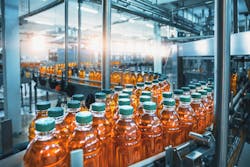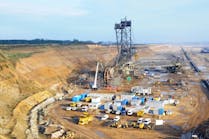Leveraging technology for improved food and beverage product quality
It may not seem like the most likely of pairings, but quality food production and technology advancements go hand-in-hand. As technology continues to reshape entire industries across the globe, the food and beverage industry is leveraging new technology that helps power the production of quality products.
Apart from simply needing to create a good-tasting product, there are also numerous regulations impacting large-scale food and beverage processing. Quality control standards and regulatory requirements — such as the Food Safety Modernization Act — ultimately protect the end-users of the product: consumers. In many industries, a lapse in product quality may not necessarily make the product dangerous; however, a mishap in food and beverage quality, be it safety, or even taste or texture, could tank customer perception and satisfaction long past the mishap.
That is why it is critical for food and beverage manufacturing plants to do everything in their power to ensure quality final product and avoid the impacts of unexpected variables that occur within the production process. To do this effectively requires the support of technologies, like asset performance management tools, that offer organizations more visibility into operations in real time, helping them best circumnavigate potential issues within plant processes that lead to poor quality end results or defective batches.
Digital transformation offers food and beverage processors a competitive advantage in that it helps them to ensure product quality. Consistent product quality issues, over time, result in a loss of revenue and wasted resources. The application of asset performance management tools to plant processes enables organizations to reverse the likelihood of poor product quality. Additionally, some solutions do not even require organizations to expend additional resources, like hiring data scientists and statisticians for procedural analysis.
Through artificial intelligence (AI) and machine learning, technology has the capability of prescribing specific solutions, based on what the data reveals, which helps processors make the necessary adjustments to avoid unwittingly making defective products. Some solutions, which offer low-touch technology, essentially democratize data, making it possible for employees of all skill sets to leverage insights. The insights yielded from complex analysis via AI and machine learning are no longer reserved for only the eyes of the seasoned, expert data scientist. Furthermore, relying on only experts to analyze vast data sets without the support of AI would not bring the level of efficiency and accuracy that asset performance management technology can capture and process.
Predicting food and beverage quality
The biggest challenge with food and beverage production is understanding what the root causes are that lead to variables in production. Without this knowledge, it is impossible to fix or adjust production to avoid it, and variances in end-product will continue to impact the organization negatively. Even if organizations can test the product in the mid-production phase, and have the time to course-correct, the lack of clear understanding of where the adjustments are needed make testing less helpful in the context of producing a quality product. Testing cannot necessarily predict or ensure quality.
Interestingly, data may be every organization’s savior in this scenario — pairing current and past production data with technology leads organizations directly to the root causes creating issues in product outcomes. The technology also predicts when and why certain processes may go awry.
For example, if a plant has a process that yields undesirable outcomes, the first step that asset performance management technology can take is to define which of the hundreds of variables are most critical to favorable process conditions. Following this, the process can then be modeled, and process behaviors and patterns monitored. When a change in behavior that is unfavorable to the desired end-product is detected, an alert is initiated. This alerts plant operators and engineers, in real time, of the variability and offers guidance for specific actions, ultimately helping plants to course-correct before final product quality is impacted.
Another interesting challenge in ensuring quality product is that the processes used to create them are not the only variables at play. This is another area in which technology can help. Choosing raw materials is essentially one of the first steps needed before the production phase. In food and beverage processing, many companies might rely on raw materials coming from different suppliers — and that may cause some discrepancies.
As an example, an ingredient from Supplier X may be different from that same ingredient that comes from Supplier Y. When used to create the same end-product, one batch may be different than the other. In the world of food and beverage processing, use of raw materials may be much more complex than that scenario, which is why it is important to rely on technology to help determine if subtle changes in the process are required — that will ensure product quality when using multiple suppliers for the same raw materials.
Technology can capture all the variable historical data available — which includes data on raw materials — to model ideal processes. From there, it might identify certain combinations of raw materials that lead to poor quality end-product, something that would have been impossible to capture without the vast set of granular data and the forthcoming analysis. A company would then know how best to leverage those raw materials on hand.
Outside of process issues and raw materials variances, there may be other hidden variables that can impede on quality. The data might reveal that an entirely separate plant function or process is impacting another process that is producing consistently unwanted outcomes. There are a multitude of factors that could alter quality, but it is through technology analysis of large data sets that open doors into increased clarity and visibility. It provides an overarching view of every possible variable, many of which would never be detected otherwise.
Optimizing processes + predicting downtime
One of the interesting aspects of modeling technology is that it can help determine what plant processes and scenarios will look like without real-world impact, giving plants more visibility in to “what/if” scenarios. This function lends itself well to more rapidly optimizing plant processes to help improve quality.
If a food or beverage product has a lapse in quality, and it is determined to be a result of a production process that takes too long or uses too much heat, plant operators can then create different models to adjust for new process designs, leveraging them to learn which designs will result in faster production or which will lead to less heat transfer.
Additionally, ensuring good quality outcomes means it is important to have a finger on the pulse of every factory scenario — and that includes unexpected downtime. If there is a glitch in a food and beverage process that pauses production, it could lead to a significant amount of product waste. Through AI and machine learning tools, predicting when equipment or assets will fail, well in advance of the event, helps businesses avoid unexpected downtime and failures, ensuring less disruption in plant processes and leading to less waste.
In conclusion, the food and beverage industry would be well-served to ride the digital transformation wave. Quality product is critical, and without technology there is much more room for undetected error in production that leads to quality issues. The support technology offers to help organizations realize increased levels of quality final products is unmatched by any data scientist or level of human expertise. What the technology finds is often beyond something the human eye can see.
Laura Stridiron is a senior product marketing manager at AspenTech. She has more than 20 years of experience in industrial maintenance and global field service across multiple industries. As a member of the AspenTech Asset Performance Management marketing team, she looks to use this background to communicate how the powerful solutions address the recurring frustrations of customers is the most value-added way. She holds a bachelor’s degree in mechanical engineering from Virginia Tech and an MBA from Indiana University.


